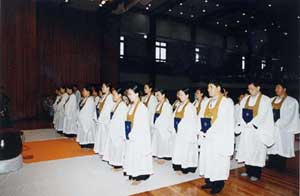Female staff of Wonbulgyo refuses to swear celibacy
On November 14, the female clergy-to-be of Wonbulgyo (translator's note: a religion based on Buddhism that originated in Korea) called for the abolishment of the oath of celibacy, collectively refusing to take the oath, which is a customary step when signing up for the Wonbulgyo studies course.
A total of 69 women staff members were schedule to take the celibacy oath that day, but 38 of them took issue with the practice and refused to take the oath. Their reasoning was that demanding the female clergy to live in celibacy was against the doctrine of Wonbulgyo.
A few months before this, on August 22, some of the women slated to take the oath had written a resolution with similar content and sent it to the Wonbulgyo foundation. The matter was later discussed during the General Meeting of the religious society, but the proposal was neither seconded nor slotted for further discussion.
Reality falls behind the equality preached by the doctrine
For more than a decade, the female staff of Wonbulgyo has continued to ask for one thing - that the reality be as equal as the doctrine says it should. Within the religious society, the women are generally assigned to domestic posts whereas men take up posts in administration or education. As a result, the women end up with the housekeeping while the men take care of so-called 'outside business,' thus following the traditional gender roles in secular society.
The problem does not end here. Says a woman staff, "Despite the fact that the women outnumber the men, the distinctive gender roles puts most of the decision-making power in the hands of the men. Not only that, the gender roles are passed down to the rest of the believers, so that most fellowships and general affairs departments in temples are headed by men." She adds that "although the highest decision-making body of the religion has specified the same number of men and women on the board, eight each, in reality people have yet to break away from patriarchal practices."

When it comes to marriage in particular, about 90% of the male staff gets married, whereas the women, who take up more than 60% of the clergy, are all single. It is the unwritten law that when a clergywoman gets married, she has to resign.
This incident is not just about a few women who refused to take their oath of celibacy. It merits attention because it signals the beginning of the search for women staff's identity within Wonbulgyo as well as the discussion of gender equality within religion in general.
What is the oath of celibacy in Wonbulgyo?
Celibate men and women in Wonbulgyo are defined as "unmarried men and women who voluntarily choose to be celibate in order to concentrate fully on only studying the doctrine of Wonbulgyo (dedicated staff)." This system was established within the religion in 1927 in order to respect the celibate men and women who choose lives of dedication and service.
The founder of Wonbulgyo as well as its scriptures leave the choice of celibacy to each dedicated staff, decreeing that 'since anyone can have a family and also pursue religious studies, or swear to celibacy for special reasons of their own, the order should accept each individual's choice and treat the individual accordingly."

